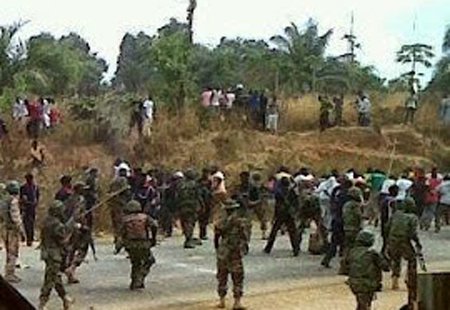Women taken hostage in the Sambisa Forest opened fire on soldiers who tried to rescue them, it was learnt yesterday.
The women – apparently forced by the terror sect into acting as conscripts – shot at the unsuspecting troops when they staged an operation to free them from the remote village of Nbita in the Northeast last week.
Seven soldiers were killed in the ensuing gunfight, in which a dozen of the women also died, according to officials who spoke to the Associated Press (AP) on the condition of anonymity because they are not authorised to speak to the media.
The captive women were among nearly 700 women and girls who have been rescued from Boko Haram hideouts in the vast Sambisa forest in recent days.
They are now being looked after at the Malkohi Internally Displaced Persons’ (IDPs’) camp, outside Yola, where many are showing signs of severe trauma and exhaustion. They were taken into the camp on Saturday after the military released them to the National Emergency Management Agency (NEMA).
A number of the children also have distended stomachs and tinted orange hair – which are signs of malnutrition. Government officials said the women were being used as cooks, sex slaves and human shields in the Boko Haram camps. Many are believed to have been abducted during raids on villages in which hundreds of menfolk were killed.
“Boko Haram killed the father of this child,” sobbed Lami Musa, a mother of four who was cradling a four-day-old girl at one displaced persons’ camp. “I have no idea where my other children are.” Many of the hostages were in such a distressed state when they were found that they had no idea whether their rescuers meant them good or harm.
Government officials are trying to determine where the women and children are from. “Based on registration we have carried out so far, none of them is from Chibok,” said Zakari Abubakar, an official of NEMA. Ms Musa’s four-day-old baby was born the day before her group set off from the Sambisa Forest area for a refugee camp in Yola, crammed into the backs of rickety, open pick-up trucks.
On the trip’s first day, one military vehicle escorting the group exploded a landmine, wounding two soldiers, according to a soldier travelling with them.
Boko Haram has been on the back foot militarily in recent months, having previously controlled an area of north-east Nigeria almost the size of Belgium. The tide turned in the past nine weeks with a new infusion of armoury, including helicopter gunships, and a coalition with troops from neighboring countries. The military has spent days “processing” and trying to identify the women and children, as they receive medical and psychological care.
A total of 22 of the group were dispatched immediately to a hospital in town due to their condition. Dr Mohammed Auwal said that many were suffering from malaria, diarrohea and malnutrition. Almost 300 children and women arrived at the displaced persons’ camp in Yola after a three-day journey to safety.
The military has said it liberated 677 girls and women and destroyed more than a dozen insurgent camps. The women arrived at the camp in Yola, the capital of Adamawa State, on the back of open pick-up trucks. One of the rescued women at the Malkohi Internally Displaced Persons’ (IDPs’) Camp outside Yola, the Adamawa State capital, has relived their experience.
According to the Associated Press (AP), a 27-year-old woman, Lami Musa, who had just given birth at the time the troops arrived, was quoted by Associated Press (AP) as saying: “Boko Haram came and told us they were moving out and said that we should run away with them. But we said ‘no’. Then they started stoning us. I held my baby to my stomach and doubled over to protect her.
“We just have to give praise to God that we are alive, those of us who have survived.”




